View Sale Announcement Detail


Archived news
EXCERPT: Banking the underbanked can be very profitable for banks, as long as proper care is taken in terms of origination and servicing these types of accounts to curb losses.
 The underbanked sector may present a profitable opportunity for banks to grow their business.
The underbanked sector may present a profitable opportunity for banks to grow their business.
In recent years, banks and financial institutions have been expanding their reach to incorporate a variety of clients, including the underbanked. In fact, the underbanked sector has presented banks with a very lucrative opportunity to boost profits recently, particularly for fintechs and savvy banks that have adopted digital platforms to their list of offerings.
Poor credit and lack of adequate funds make it very difficult, if not impossible, to access traditional banking products and services that primary consumers can take advantage of. This has opened up a potentially profitable market opportunity for financial institutions to offer low-cost solutions to the underbanked.
Banking the Underbanked
Conventional banks don't have a great track record of serving consumers in the subprime category with affordable, accessible banking products. Millions of Americans who can be considered subprime consumers typically deal with a variety of issues in the banking industry, such as unpredictable fees and limited functions. That's where fintechs can step in to serve this sector.
But banks are growing their subprime banking and lending practices, focusing more on the underbanked as part of an effort to expand their business.
Some banks are testing the waters on what would otherwise be considered risky products. Ally Financial, for instance, recently announced a $2.65 billion deal to acquire CardWorks, a non-prime consumer finance lender that offers unsecured credit cards and the parent company of Merrick Bank. Ally started as an auto financing entity before venturing into online banking offerings and mortgage lending.
The transaction will allow Ally Financial to expand its reach and get into the credit card and merchant services sectors. The auto lender says it may eventually offer a credit card for more creditworthy prime consumers.
 Ally Financial recently announced its acquisition of non-prime consumer finance lender CardWorks in an effort to get into the underbanked sector.
Ally Financial recently announced its acquisition of non-prime consumer finance lender CardWorks in an effort to get into the underbanked sector.
Ally's recent transaction may be an incredibly lucrative one. Last year, CardWorks brought in $277 million in income before taxes on assets of less than $5 billion. Over the first three quarters of 2019, Merrick Bank’s return on assets was over four times higher than the US banking average.
But banks aren't necessarily the only entities to see credit cards to non-prime consumers and other riskier consumer products as a potential opportunity right now. E-commerce giant Amazon recently entered the secured credit card market, giving traditional fintechs a run for their money. Amazon is showing others that there may be a viable opportunity to offer credit to consumers who otherwise would not be able to establish and build credit.
Launched in June 2019, Amazon's Credit Builder Card will give subprime consumers a chance to shop online with a secure credit card while earning 5% rewards on all Amazon purchases. This platform is one of the banking industry’s first private-label secured credit cards.
Taking a Closer Look at Your Loan Portfolio
Whether or not your financial institution is considering growing its client base by expanding its product and service offerings, it's still prudent practice to revisit your loan portfolio to ensure it is robust enough to withstand any potential economic downturn. Selling off risky assets and making room for stronger short-term assets is encouraged, and Garnet Capital can help put you in touch with qualified buyers and foster sound acquisitions to create a resilient loan portfolio.
Sign up for our newsletter today.

